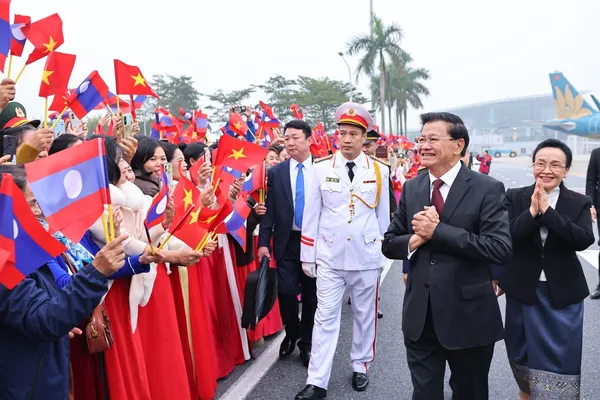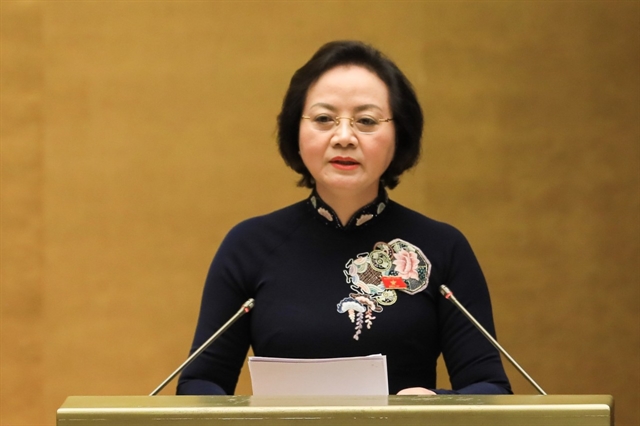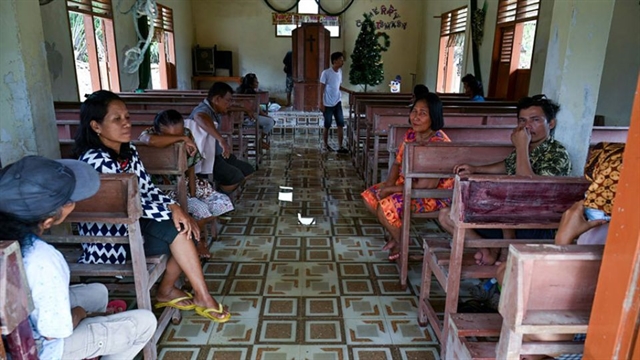 Politics & Law
Politics & Law

Minister of Home Affairs Phạm Thị Thanh Trà presented a report on a draft law on the implementation of democracy at a grassroots level, as a part of the ongoing third session of the National Assembly yesterday morning in Hà Nội.

|
| Minister of Home Affairs Phạm Thị Thanh Trà at the National Assembly meeting yesterday. Photo thoibaotaichinhvietnam.vn |
HÀ NỘI — Minister of Home Affairs Phạm Thị Thanh Trà presented a report on a draft law on the implementation of democracy at a grassroots level, as a part of the ongoing third session of the National Assembly yesterday morning in Hà Nội.
The minister said that the draft law has new contents.
The draft law specifically stipulates the rights and obligations of citizens, cadres, civil servants, public employees and employees in the implementation of grassroots democracy. The provision on the authorisation of grassroots democracy implementation is added.
Under the draft, people have the right to complain, initiate lawsuits and denounce violations relating to the implementation of democracy at the grassroots levels. People have the obligation to propose and report to competent authorities when detecting violations in its implementation.
In implementing democracy in agencies and units, the draft law added the form of information disclosure, collecting opinions through an internal information system, or posting on portals and information pages of agencies or units.
The form of inspection and supervision on the activities of taking votes of confidence for leadership and management positions in agencies and units according to regulations of competent agencies have been added in this draft too.
Additional content in the draft covers employees' rights to decide on the level of contributions to social and charity funds at enterprises.
Different opinions on the implementation of democracy in business were also reported to the National Assembly during the session.
The first opinion suggests that the law should not stipulate the implementation of democracy in enterprises, while the second opinion wants the bill to stipulate a separate chapter on the content and implementation of democracy in various types of enterprises, including a number of peculiarities for state-owned units.
At the meeting, Chairman Hoàng Thanh Tùng of the National Assembly's Law Committee said the committee agrees with the extension of the regulatory scope of the draft law to regulate the implementation of democracy at the grassroots levels including communes, wards, townships and residential communities, agencies, agencies of the Party and public non-business units, socio-political organisations and businesses.
It also agreed to assign competent agencies, organisations and individuals to specify the implementation of democracy within agencies and particular institutions such as Party agencies, the National Assembly, the People's Council, the People's Court, the People's Procuracy, the People's Army, the People's Public Security, and socio-political organisations from central to local levels.
Most of the participants in the Law Committee agreed that the law should have a separate chapter stipulating the content, form and method of implementing democracy in enterprises, as well as some specific provisions for State-owned enterprises, which directly manage and use resources of the State, Chairman Tùng said.
More detailed provisions of the law on the implementation of democracy in State-owned enterprises will contribute to improving the efficiency of management and use of investment resources of the State, controlling corruption, negativity and wastefulness.
More detailed regulations on democracy in State-owned enterprises were also needed, especially those for employees to give opinions, discuss, decide and check.
There is also an opinion suggesting that this law should only regulate the implementation of democracy in State-owned enterprises which directly manage and use investment resources of the State.
In non-state businesses, relationships between employee and employer are based on contracts and amount to an agreement between the parties. Disputes and conflicts are resolved through dialogue, conciliation, negotiation and arbitration.
Regulations on the implementation of democracy in enterprises as in the draft law are likely to cause difficulties for businesses and economic organisations in the non-state sector in the implementation, participants said.
This bill will be further discussed at the National Assembly on June 16. — VNS




